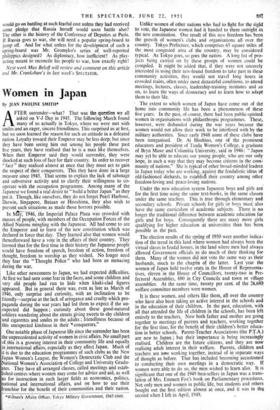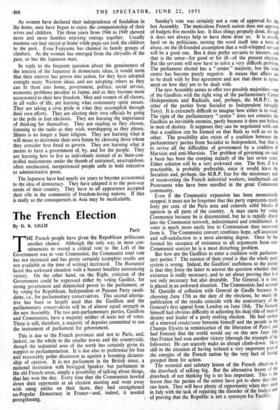Women in Japan
By JEAN PAUk1NE SMITH*
AFTER surrender—what? That was the question we all asked on V-J Day in 1945. The following March found many of us actually in Tokyo, where we were met with smiles and an eager, sincere friendliness. This surprised us at first, but we soon learned the reason for such an attitude in a defeated nation. Loyalty toward their Emperor may be less deep; but since they have been seeing him out among his people these past five years, they have realised that he is a man like themselves. When their Emperor said they would surrender, they were shocked at such loss of face for their country. In order to recover " face " they realised almost at once that they must act to gain the respect of their conquerors. This they have done in a large measure since 1945. That seems to explain the lack of sabotage and subversive activity and to clarify their willingness to co- operate with the occupation programme. Among many of the Japanese we found a real desire to " build a better Japan" as they put it. Though, like ourselves, they do not forget Pearl Harbour, Darwin, Singapore, Bataan or Hiroshima, they also wish to preyent such situations as made those horrors possible.
In Mr., 1946, the Imperial Palace Plaza was crowded with masses of people, with members of the Occupation Forces of the Allied Nations mingling with the Japanese. All had come to see the Emperor and to learn of the new constitution which was declared in force that day. They learned also that women would thenceforward have a vote in the affairs of their country. They learned that for the first time in their history the Japanese people would have freedom of speech, freedom of action, freedom of thought, freedom to worship as they wished. No longer need they fear the " Thought Police " who had been so menacing during the war.
Like other newcomers to Japan, we had expected difficulties. At first we had seen some fear in the faces, and some children and very old people had run to hide when khaki-clad figures appeared. But in general there was, even as late as March of 1946, only surprise and curiosity, with an inclination to be friendly—surprise at the lack of arrogance and cruelty which pro- paganda during the war years had led them to expect if the un- expected did happen ; curiosity about these good-natured soldiers wandering about the streets giving sweets to shy children and cigarettes and smiles to the adults ; friendliness because of this unexpected kindness in their " conq uerors."
One notable phase of Japanese life since the surrender has been the unprecedented activity of women in civic affairs. No small part of this is a growing interest in their community life and equally in international affairs, especially as they affect Japan. Much of it is due to the education programmes of such clubs as the New Japan Women's League, the Women's Democratic Club and the ational Women's Association of College and University Gradu- ates. They have all arranged classes, called meetings and estab- lished centres where women may come for advice and aid, as well s for instruction in such larger fields as economics, politics, ational and international affairs, and on how to use their ranchise for the benefit of their communities and their nation.
*W n's Affairs Officer. Tokyo Military Government, 1947-1949. Unlike women of other nations who had to fight for the right to vote, the Japanese women had it handed to them outright in the new constitution. One result of this new freedom has been the growth of women's clubs and organisations all over the country. Tokyo Prefecture, which comprises 65 square miles of the most congested area of the country, may be considered typical. As Tokyo goes, so goes the nation. A long list of pro- jects being carried on by these groups of women could be compiled. It might be added that. if they were not sincerely interested in using their new-found freedom to take part in these community activities, they would not travel long hours in crowded trains, often under most distasteful conditions, to attend meetings, lectures, classes, leadership-training institutes and so on, to learn the ways of democracy and to learn how to adapt them to their life.
• The extent to which women of Japan have come out of the home into community life has been a phenomenon of these five years. In the past, of course, there had been public-spirited women in organisations with philanthropic programmes. These, however, were disbanded during the war years because the women would not allow their work to be interfered with by the military authorities. Since early 1948 some of these clubs have been reorganised. Dr. Ai Hoshino, one of the prominent educators and president of Tsuda Women's College. a graduate of Bryn Mawr and Columbia University, said in 1946: " Japan may yet be able to educate our young people, who are our only hope, in such a way that they may become citizens in the conyi munity of nations." She is typical of other broad-minded leaders in Japan today who are working, against the feudalistic ideas of old-fashioned diehards, to establish their country among other freedom-loving and peace-loving nations.
Under the new education system Japanese boys and girls are for the first time using the same text-books, in the same classes under the same teachers. This is true through elementary and secondary schools. Private schools for girls or boys must also have the same curriculum of academic subjects. There, is no longer the traditional difference between academic education for girls and for boys. Consequently there are many more girls qualifying for higher education at universities than has been possible in the past.
The election results of the spring of 1950 were another indica= tion of the trend in this land where women had always been the virtual slaves in feudal homes, in the land where men had always allowed Government officials to do much of their thinking for them. Many of the women did not vote the same way as their husbands, much to the chagrin of the latter. Last year the women of Japan held twelve seats in the House of Representa- tives, eleven in the House of Councillors, twenty-two in Pre- fectural Assemblies, 800 in City' Councils and town or village assemblies. At the same time, twenty per cent. of the 26,680 welfare committee members were women.
It is these women, and others like them, all over the country who have also been taking an active interest in the schools and in the education of their. children. In the past, education, with all that attended the life of children in the schools, has been left entirely to the teachers. Now both father and mother are going together to meetings of parents and teachers, working together for the first time, for the benefit of their children's better educa- tion in better schools. Parent-Teacher Associations (the P.T.A.) are new to Japan ; but their importance is being increasingly realised. Children are the future citizens, and they are now realising adult interest in their welfare. Parents, children and teachers are now working together, instead of in separate ways of thought as before. That hai included becoming accustomed to conducting their own meetings in a democratic way. If women were able to do so, the men wished to learn also. It is significant that one of the 1949 best-sellers in Japan was a trans- lation of Mrs. Emmett Fox's book on Parliamentary procedures. Not only men and women in public life, but students and others bought out the first edition almost at once, and it was in the' second when I left in April, 1949. s As women have declared their independence of feudalism in the home, men have begun to enjoy the companionship of their wives and children. The three years from 1946 to 1949 showed more and more families enjoying outings together. Usually mamma-san had stayed at home while papa-san took the children to the park. Even Fujiyama has claimed its family groups of climbers. As the woman has emerged from the chrysalis of the past, so has the Japanese man.
In reply to the frequent question about the genuineness of the interest of the Japanese in democratic ideas, it would seem that their interest has grown into action, for they have adopted outright many Western ideas, and are adopting others as they can fit them into home, government, politics, social service, economic problems peculiar to Japan, and as they become more accustomed to their new freedom. Men and women of all classes, in all walks of life, are learning what community spirit means. They are taking a civic pride in what they accomplish through their own efforts. They are electing their own officials by going to the polls in free elections. They are learning Os importance of thinking for themselves. They are reading as they choose, listening to the radio as they wish, worshipping as they please. Shinto is no longer a State religion. They are learning what it will mean to determine their own future by choosing those whom they consider best fitted to govern. They are learning what it means to have a government of. by, and for the people. They are learning how to live as individuals instead of as State-con- trolled malcontents under the thumb of untrained, unscrupulous. often uneducated, inexperienced people unfit to hold executive or administrative posts.
The Japanese have had nearly six years to become accustomed to the idea of democracy. They have adapted it to the post-war needs of their country. They have to all appearance accepted their role in the community of freedom-loving nations. If that is really so the consequences in Asia may be incalculable.



















































 Previous page
Previous page